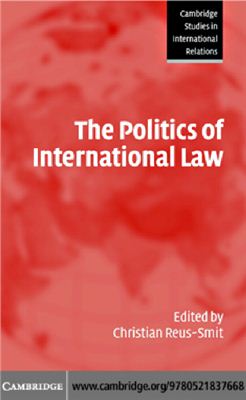Cambridge University Press, 2004. 324 p.
Politics and law appear deeply entwined in contemporary inteational relations. Yet existing perspectives struggle to understand the complex interplay between these aspects of inteational life. In this path-breaking volume, a group of leading inteational relations scholars and legal theorists advance a new constructivist perspective on the politics of inteational law. They reconceive politics as a field of human action that stands at the intersection of issues of identity, purpose, ethics, and strategy, and define law as an historically contingent institutional expression of such politics. They explain how liberal politics has conditioned mode inteational law and how law ‘feeds back’ to constitute inteational relations and world politics. This new perspective on the politics of inteational law is illustrated through detailed case-studies of the use of force, climate change, landmines, migrant rights, the Inteational Criminal Court, the Kosovo bombing campaign,
inteational financial institutions, and global goveance.
The politics of inteational law. Christian Reus-Smit
When states use armed force. Dino Kritsiotis
Soft law, hard politics, and the Climate Change Treaty. Robyn Eckersley
Emerging customary norms and anti-personnel landmines. Richard Price
Inteational law, politics, and migrant rights. Amy Gurowitz
The Inteational Criminal Court. David Wippman
The Kosovo bombing campaign. Nicholas J. Wheeler
Inteational financial institutions. Antony Anghie
Law, politics, and inteational goveance. Wayne Sandholtz and Alec Stone Sweet
Society, power, and ethics. Christian Reus-Smit
Politics and law appear deeply entwined in contemporary inteational relations. Yet existing perspectives struggle to understand the complex interplay between these aspects of inteational life. In this path-breaking volume, a group of leading inteational relations scholars and legal theorists advance a new constructivist perspective on the politics of inteational law. They reconceive politics as a field of human action that stands at the intersection of issues of identity, purpose, ethics, and strategy, and define law as an historically contingent institutional expression of such politics. They explain how liberal politics has conditioned mode inteational law and how law ‘feeds back’ to constitute inteational relations and world politics. This new perspective on the politics of inteational law is illustrated through detailed case-studies of the use of force, climate change, landmines, migrant rights, the Inteational Criminal Court, the Kosovo bombing campaign,
inteational financial institutions, and global goveance.
The politics of inteational law. Christian Reus-Smit
When states use armed force. Dino Kritsiotis
Soft law, hard politics, and the Climate Change Treaty. Robyn Eckersley
Emerging customary norms and anti-personnel landmines. Richard Price
Inteational law, politics, and migrant rights. Amy Gurowitz
The Inteational Criminal Court. David Wippman
The Kosovo bombing campaign. Nicholas J. Wheeler
Inteational financial institutions. Antony Anghie
Law, politics, and inteational goveance. Wayne Sandholtz and Alec Stone Sweet
Society, power, and ethics. Christian Reus-Smit

